Impact of Holistic Marketing on Consumer Behaviour: Coca-Cola
VerifiedAdded on 2022/08/15
|24
|6463
|15
Thesis and Dissertation
AI Summary
This dissertation investigates the impact of holistic marketing on consumer behavior, using Coca-Cola as a primary case study. The research begins with an introduction, outlining the research title, background, aims, objectives, questions, and significance. The study explores the concept of holistic marketing, its components (internal, performance, integrated, and relationship marketing), and its connection to consumer behavior. A comprehensive literature review examines existing scholarly articles and marketing theories, providing a foundation for the research. The methodology section details the research methods employed to gather and analyze data. The findings and results section presents the outcomes of the study, followed by an analysis and discussion of the data. The dissertation concludes with a summary of the key findings, recommendations for future research, and an assessment of the limitations of the study. Overall, the dissertation aims to provide insights into how holistic marketing strategies influence consumer perceptions and behaviors, with a specific focus on Coca-Cola's marketing approach.
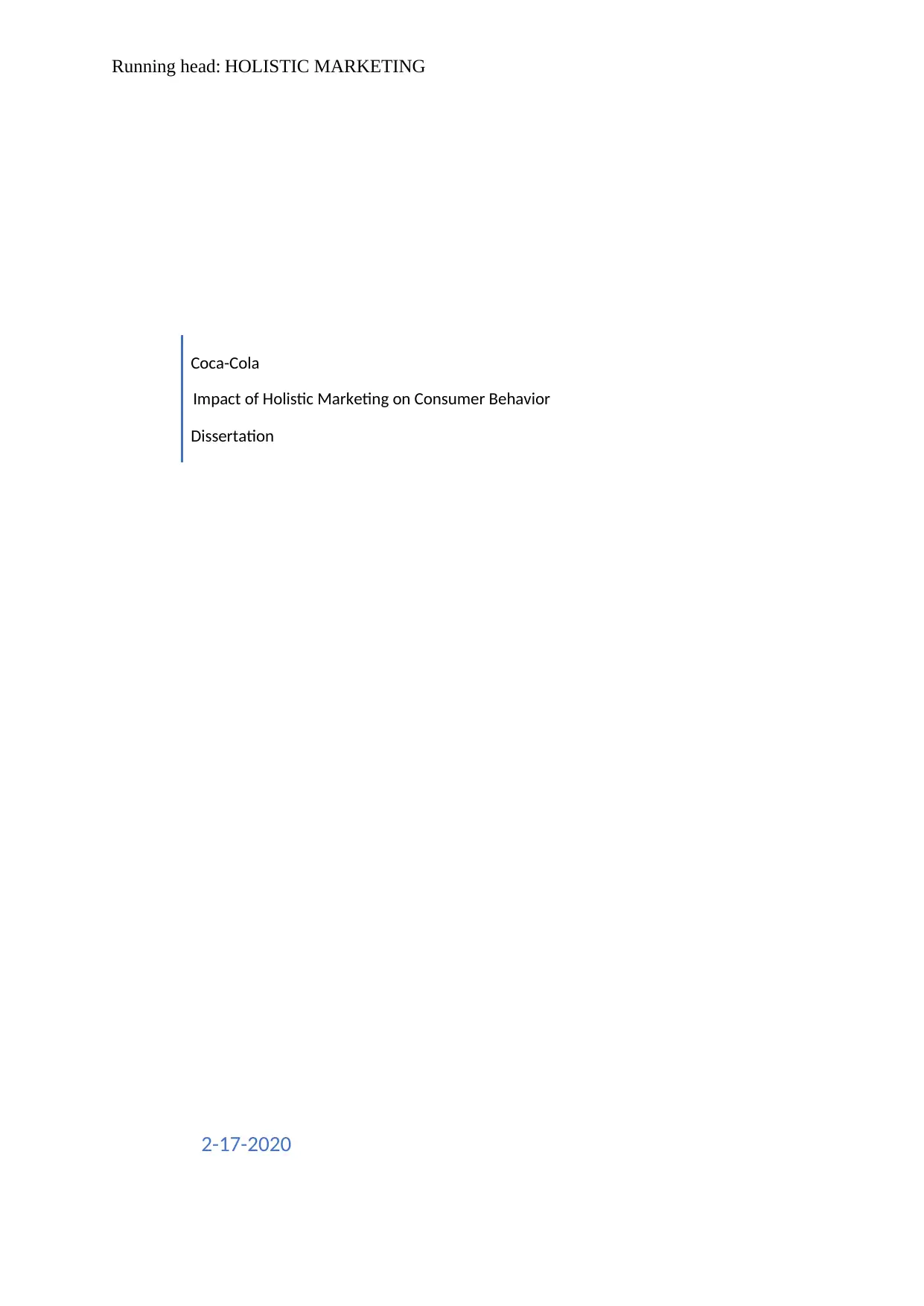
Running head: HOLISTIC MARKETING
Coca-Cola
Impact of Holistic Marketing on Consumer Behavior
Dissertation
2-17-2020
Coca-Cola
Impact of Holistic Marketing on Consumer Behavior
Dissertation
2-17-2020
Paraphrase This Document
Need a fresh take? Get an instant paraphrase of this document with our AI Paraphraser
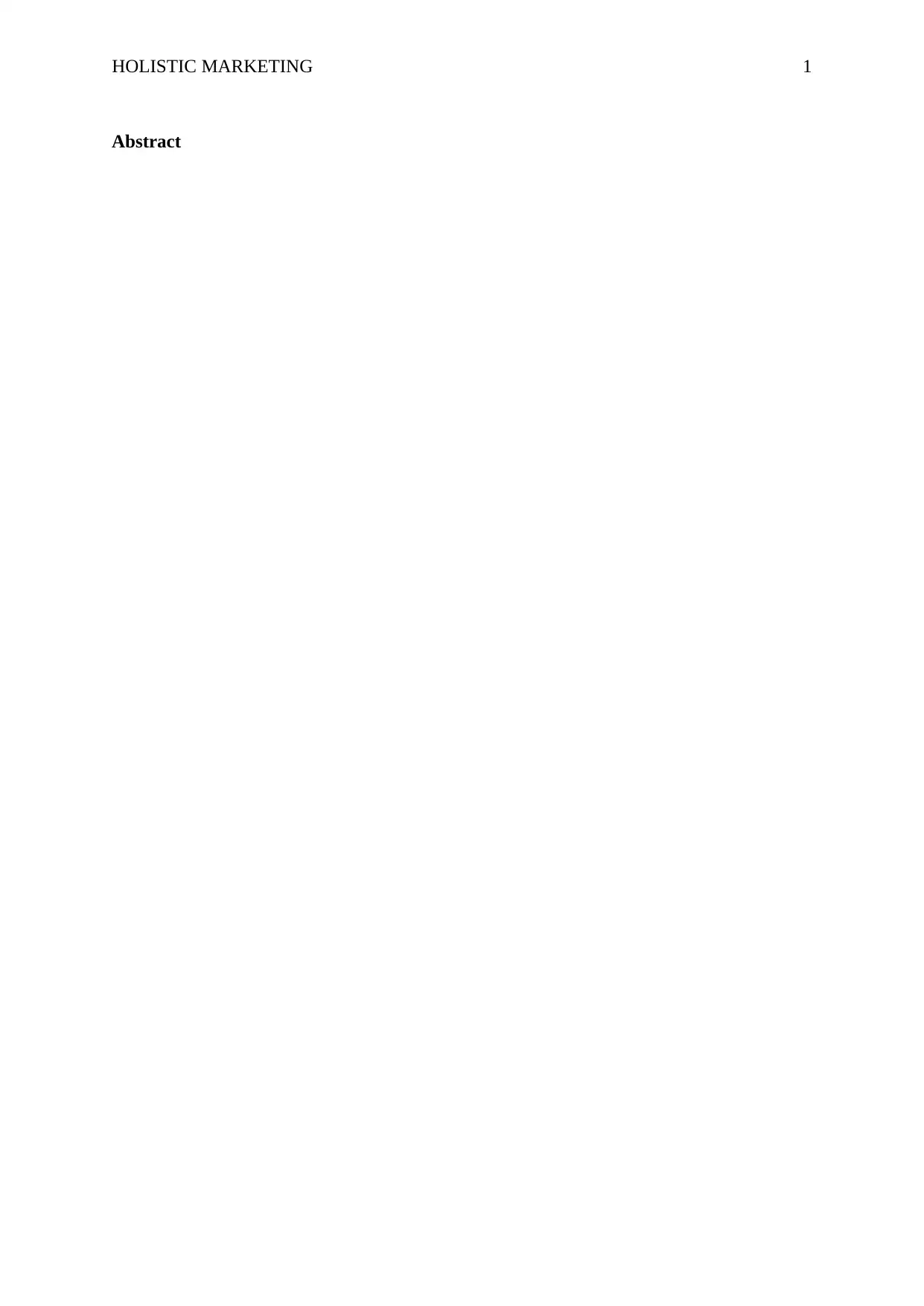
HOLISTIC MARKETING 1
Abstract
Abstract
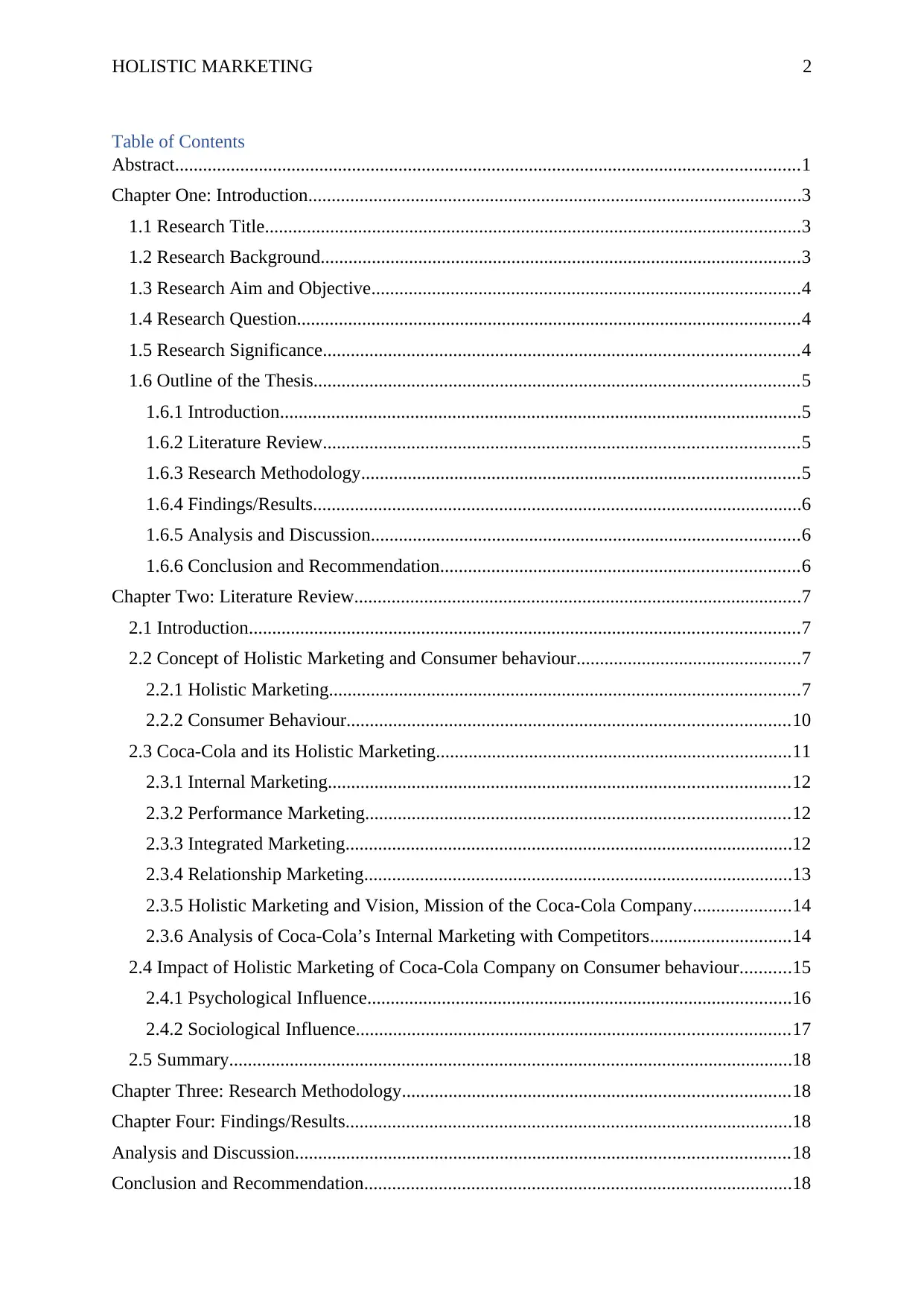
HOLISTIC MARKETING 2
Table of Contents
Abstract......................................................................................................................................1
Chapter One: Introduction..........................................................................................................3
1.1 Research Title...................................................................................................................3
1.2 Research Background.......................................................................................................3
1.3 Research Aim and Objective............................................................................................4
1.4 Research Question............................................................................................................4
1.5 Research Significance......................................................................................................4
1.6 Outline of the Thesis........................................................................................................5
1.6.1 Introduction................................................................................................................5
1.6.2 Literature Review......................................................................................................5
1.6.3 Research Methodology..............................................................................................5
1.6.4 Findings/Results.........................................................................................................6
1.6.5 Analysis and Discussion............................................................................................6
1.6.6 Conclusion and Recommendation.............................................................................6
Chapter Two: Literature Review................................................................................................7
2.1 Introduction......................................................................................................................7
2.2 Concept of Holistic Marketing and Consumer behaviour................................................7
2.2.1 Holistic Marketing.....................................................................................................7
2.2.2 Consumer Behaviour...............................................................................................10
2.3 Coca-Cola and its Holistic Marketing............................................................................11
2.3.1 Internal Marketing...................................................................................................12
2.3.2 Performance Marketing...........................................................................................12
2.3.3 Integrated Marketing................................................................................................12
2.3.4 Relationship Marketing............................................................................................13
2.3.5 Holistic Marketing and Vision, Mission of the Coca-Cola Company.....................14
2.3.6 Analysis of Coca-Cola’s Internal Marketing with Competitors..............................14
2.4 Impact of Holistic Marketing of Coca-Cola Company on Consumer behaviour...........15
2.4.1 Psychological Influence...........................................................................................16
2.4.2 Sociological Influence.............................................................................................17
2.5 Summary.........................................................................................................................18
Chapter Three: Research Methodology...................................................................................18
Chapter Four: Findings/Results................................................................................................18
Analysis and Discussion..........................................................................................................18
Conclusion and Recommendation............................................................................................18
Table of Contents
Abstract......................................................................................................................................1
Chapter One: Introduction..........................................................................................................3
1.1 Research Title...................................................................................................................3
1.2 Research Background.......................................................................................................3
1.3 Research Aim and Objective............................................................................................4
1.4 Research Question............................................................................................................4
1.5 Research Significance......................................................................................................4
1.6 Outline of the Thesis........................................................................................................5
1.6.1 Introduction................................................................................................................5
1.6.2 Literature Review......................................................................................................5
1.6.3 Research Methodology..............................................................................................5
1.6.4 Findings/Results.........................................................................................................6
1.6.5 Analysis and Discussion............................................................................................6
1.6.6 Conclusion and Recommendation.............................................................................6
Chapter Two: Literature Review................................................................................................7
2.1 Introduction......................................................................................................................7
2.2 Concept of Holistic Marketing and Consumer behaviour................................................7
2.2.1 Holistic Marketing.....................................................................................................7
2.2.2 Consumer Behaviour...............................................................................................10
2.3 Coca-Cola and its Holistic Marketing............................................................................11
2.3.1 Internal Marketing...................................................................................................12
2.3.2 Performance Marketing...........................................................................................12
2.3.3 Integrated Marketing................................................................................................12
2.3.4 Relationship Marketing............................................................................................13
2.3.5 Holistic Marketing and Vision, Mission of the Coca-Cola Company.....................14
2.3.6 Analysis of Coca-Cola’s Internal Marketing with Competitors..............................14
2.4 Impact of Holistic Marketing of Coca-Cola Company on Consumer behaviour...........15
2.4.1 Psychological Influence...........................................................................................16
2.4.2 Sociological Influence.............................................................................................17
2.5 Summary.........................................................................................................................18
Chapter Three: Research Methodology...................................................................................18
Chapter Four: Findings/Results................................................................................................18
Analysis and Discussion..........................................................................................................18
Conclusion and Recommendation............................................................................................18
⊘ This is a preview!⊘
Do you want full access?
Subscribe today to unlock all pages.

Trusted by 1+ million students worldwide
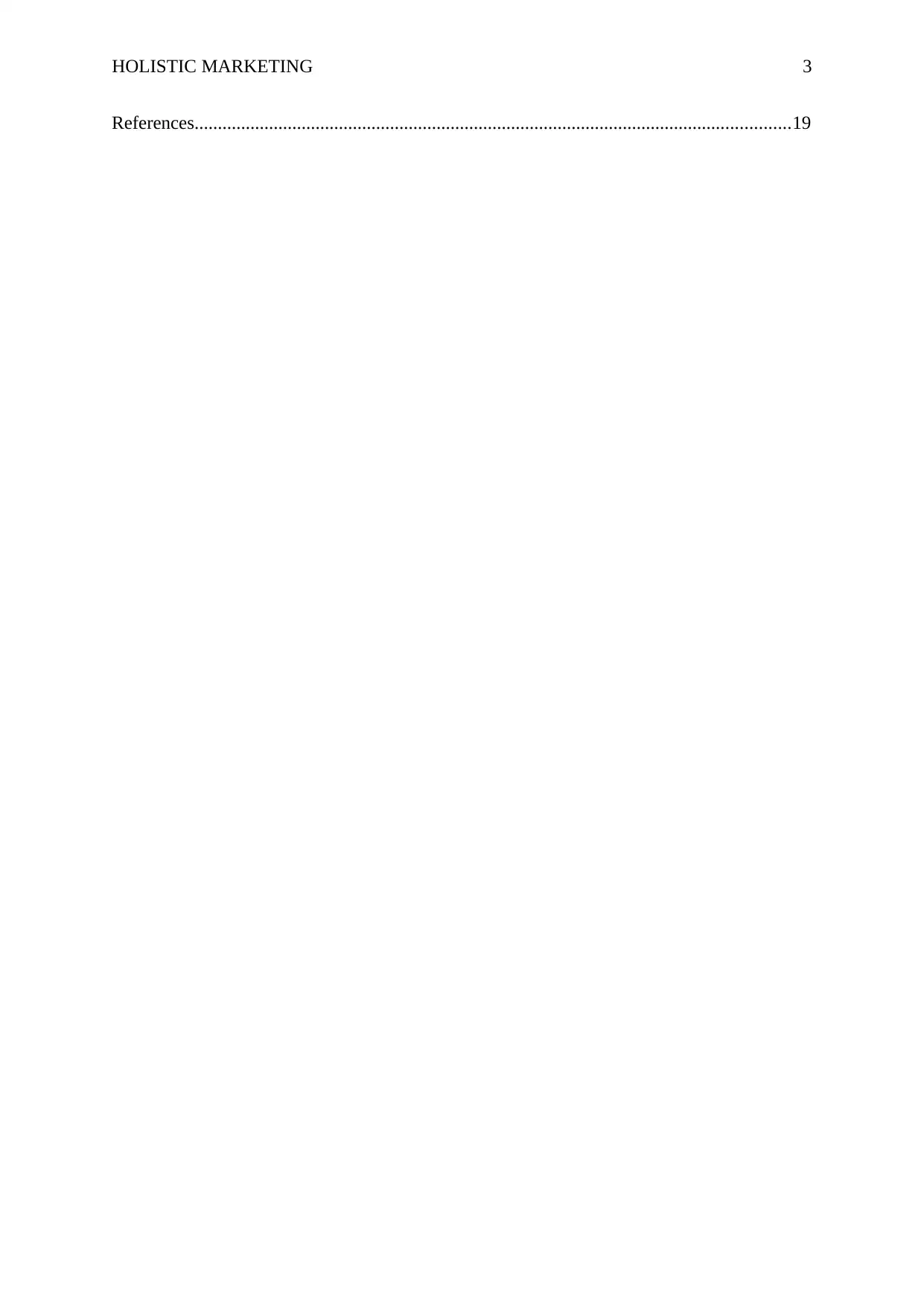
HOLISTIC MARKETING 3
References................................................................................................................................19
References................................................................................................................................19
Paraphrase This Document
Need a fresh take? Get an instant paraphrase of this document with our AI Paraphraser
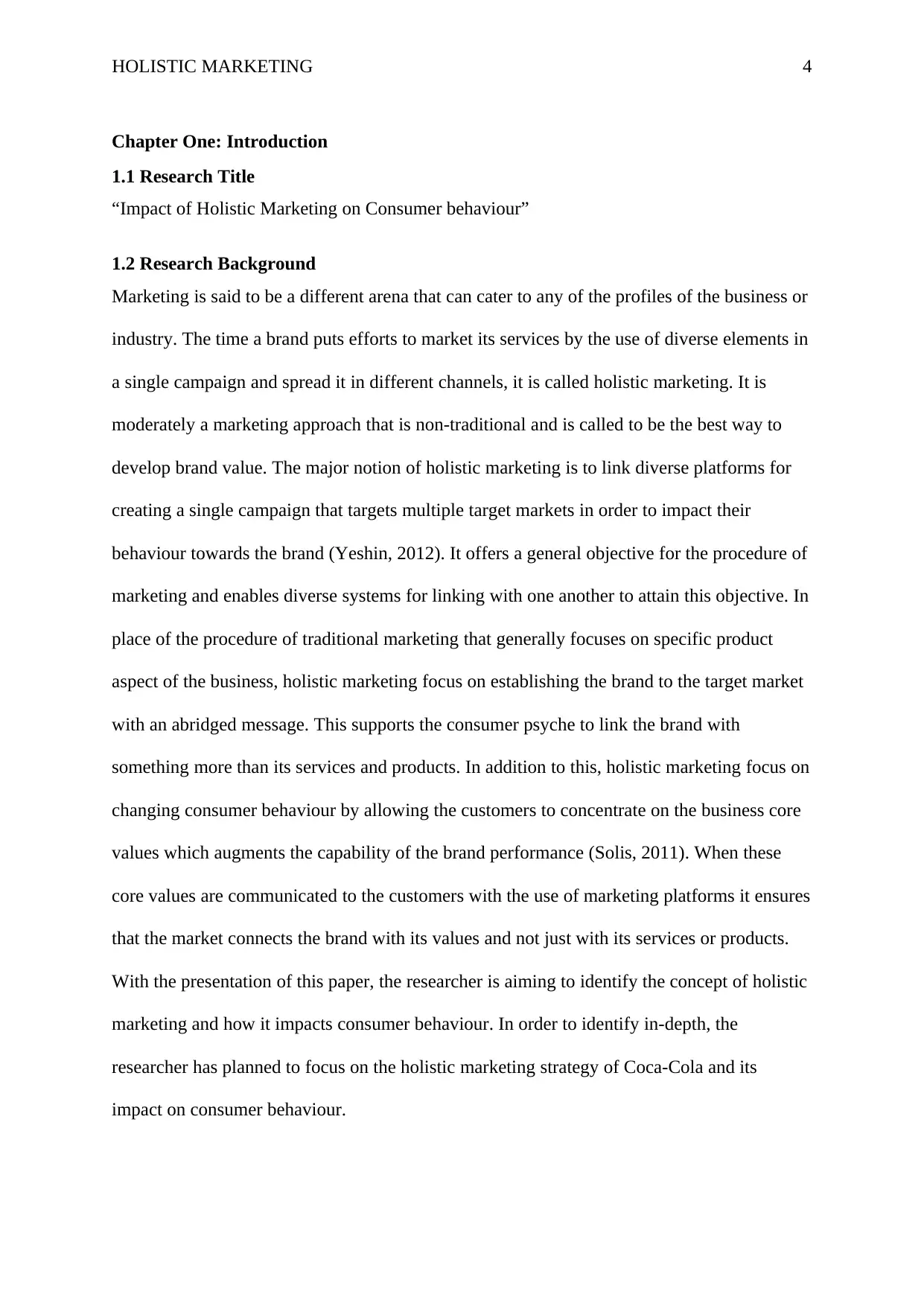
HOLISTIC MARKETING 4
Chapter One: Introduction
1.1 Research Title
“Impact of Holistic Marketing on Consumer behaviour”
1.2 Research Background
Marketing is said to be a different arena that can cater to any of the profiles of the business or
industry. The time a brand puts efforts to market its services by the use of diverse elements in
a single campaign and spread it in different channels, it is called holistic marketing. It is
moderately a marketing approach that is non-traditional and is called to be the best way to
develop brand value. The major notion of holistic marketing is to link diverse platforms for
creating a single campaign that targets multiple target markets in order to impact their
behaviour towards the brand (Yeshin, 2012). It offers a general objective for the procedure of
marketing and enables diverse systems for linking with one another to attain this objective. In
place of the procedure of traditional marketing that generally focuses on specific product
aspect of the business, holistic marketing focus on establishing the brand to the target market
with an abridged message. This supports the consumer psyche to link the brand with
something more than its services and products. In addition to this, holistic marketing focus on
changing consumer behaviour by allowing the customers to concentrate on the business core
values which augments the capability of the brand performance (Solis, 2011). When these
core values are communicated to the customers with the use of marketing platforms it ensures
that the market connects the brand with its values and not just with its services or products.
With the presentation of this paper, the researcher is aiming to identify the concept of holistic
marketing and how it impacts consumer behaviour. In order to identify in-depth, the
researcher has planned to focus on the holistic marketing strategy of Coca-Cola and its
impact on consumer behaviour.
Chapter One: Introduction
1.1 Research Title
“Impact of Holistic Marketing on Consumer behaviour”
1.2 Research Background
Marketing is said to be a different arena that can cater to any of the profiles of the business or
industry. The time a brand puts efforts to market its services by the use of diverse elements in
a single campaign and spread it in different channels, it is called holistic marketing. It is
moderately a marketing approach that is non-traditional and is called to be the best way to
develop brand value. The major notion of holistic marketing is to link diverse platforms for
creating a single campaign that targets multiple target markets in order to impact their
behaviour towards the brand (Yeshin, 2012). It offers a general objective for the procedure of
marketing and enables diverse systems for linking with one another to attain this objective. In
place of the procedure of traditional marketing that generally focuses on specific product
aspect of the business, holistic marketing focus on establishing the brand to the target market
with an abridged message. This supports the consumer psyche to link the brand with
something more than its services and products. In addition to this, holistic marketing focus on
changing consumer behaviour by allowing the customers to concentrate on the business core
values which augments the capability of the brand performance (Solis, 2011). When these
core values are communicated to the customers with the use of marketing platforms it ensures
that the market connects the brand with its values and not just with its services or products.
With the presentation of this paper, the researcher is aiming to identify the concept of holistic
marketing and how it impacts consumer behaviour. In order to identify in-depth, the
researcher has planned to focus on the holistic marketing strategy of Coca-Cola and its
impact on consumer behaviour.
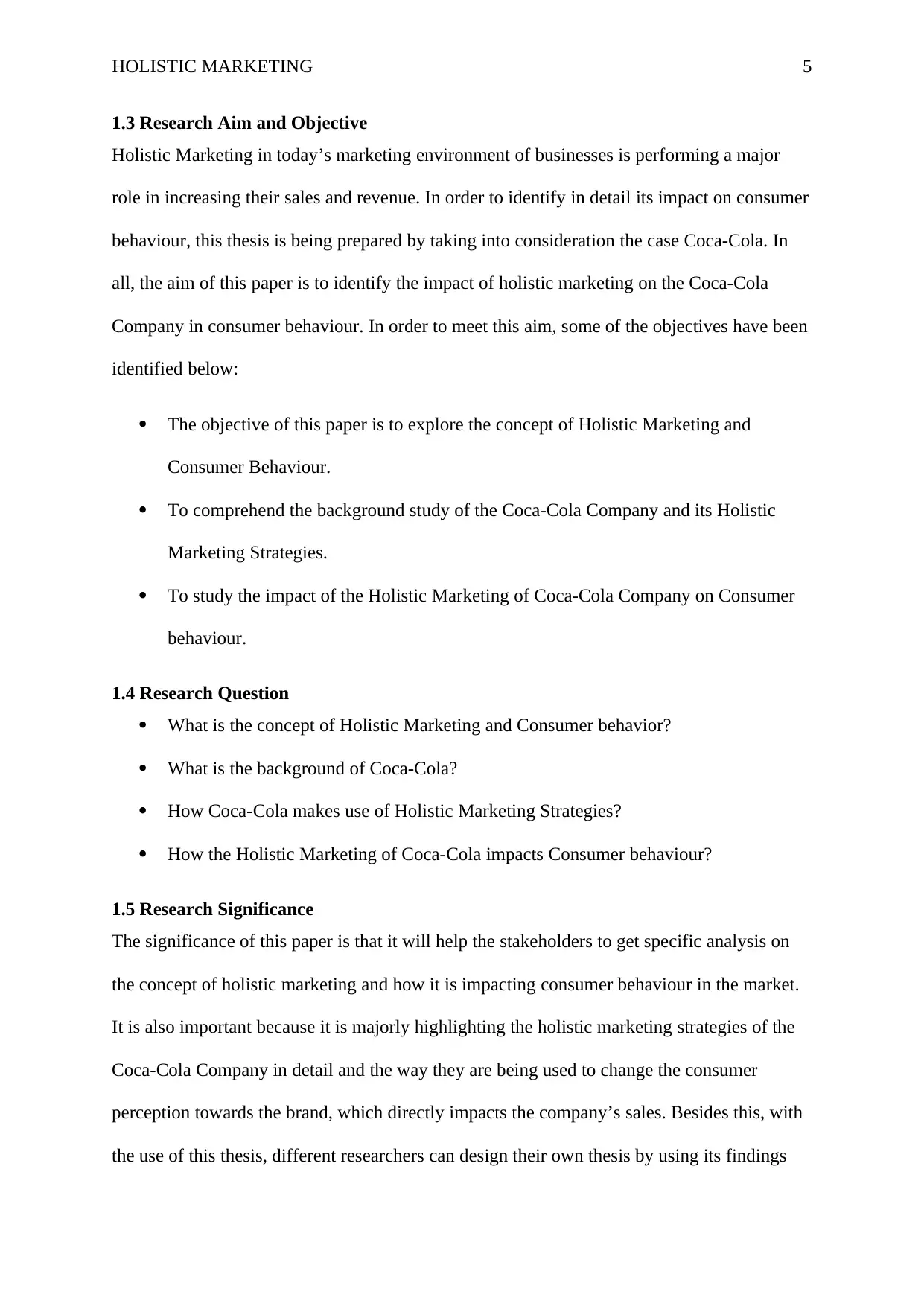
HOLISTIC MARKETING 5
1.3 Research Aim and Objective
Holistic Marketing in today’s marketing environment of businesses is performing a major
role in increasing their sales and revenue. In order to identify in detail its impact on consumer
behaviour, this thesis is being prepared by taking into consideration the case Coca-Cola. In
all, the aim of this paper is to identify the impact of holistic marketing on the Coca-Cola
Company in consumer behaviour. In order to meet this aim, some of the objectives have been
identified below:
The objective of this paper is to explore the concept of Holistic Marketing and
Consumer Behaviour.
To comprehend the background study of the Coca-Cola Company and its Holistic
Marketing Strategies.
To study the impact of the Holistic Marketing of Coca-Cola Company on Consumer
behaviour.
1.4 Research Question
What is the concept of Holistic Marketing and Consumer behavior?
What is the background of Coca-Cola?
How Coca-Cola makes use of Holistic Marketing Strategies?
How the Holistic Marketing of Coca-Cola impacts Consumer behaviour?
1.5 Research Significance
The significance of this paper is that it will help the stakeholders to get specific analysis on
the concept of holistic marketing and how it is impacting consumer behaviour in the market.
It is also important because it is majorly highlighting the holistic marketing strategies of the
Coca-Cola Company in detail and the way they are being used to change the consumer
perception towards the brand, which directly impacts the company’s sales. Besides this, with
the use of this thesis, different researchers can design their own thesis by using its findings
1.3 Research Aim and Objective
Holistic Marketing in today’s marketing environment of businesses is performing a major
role in increasing their sales and revenue. In order to identify in detail its impact on consumer
behaviour, this thesis is being prepared by taking into consideration the case Coca-Cola. In
all, the aim of this paper is to identify the impact of holistic marketing on the Coca-Cola
Company in consumer behaviour. In order to meet this aim, some of the objectives have been
identified below:
The objective of this paper is to explore the concept of Holistic Marketing and
Consumer Behaviour.
To comprehend the background study of the Coca-Cola Company and its Holistic
Marketing Strategies.
To study the impact of the Holistic Marketing of Coca-Cola Company on Consumer
behaviour.
1.4 Research Question
What is the concept of Holistic Marketing and Consumer behavior?
What is the background of Coca-Cola?
How Coca-Cola makes use of Holistic Marketing Strategies?
How the Holistic Marketing of Coca-Cola impacts Consumer behaviour?
1.5 Research Significance
The significance of this paper is that it will help the stakeholders to get specific analysis on
the concept of holistic marketing and how it is impacting consumer behaviour in the market.
It is also important because it is majorly highlighting the holistic marketing strategies of the
Coca-Cola Company in detail and the way they are being used to change the consumer
perception towards the brand, which directly impacts the company’s sales. Besides this, with
the use of this thesis, different researchers can design their own thesis by using its findings
⊘ This is a preview!⊘
Do you want full access?
Subscribe today to unlock all pages.

Trusted by 1+ million students worldwide
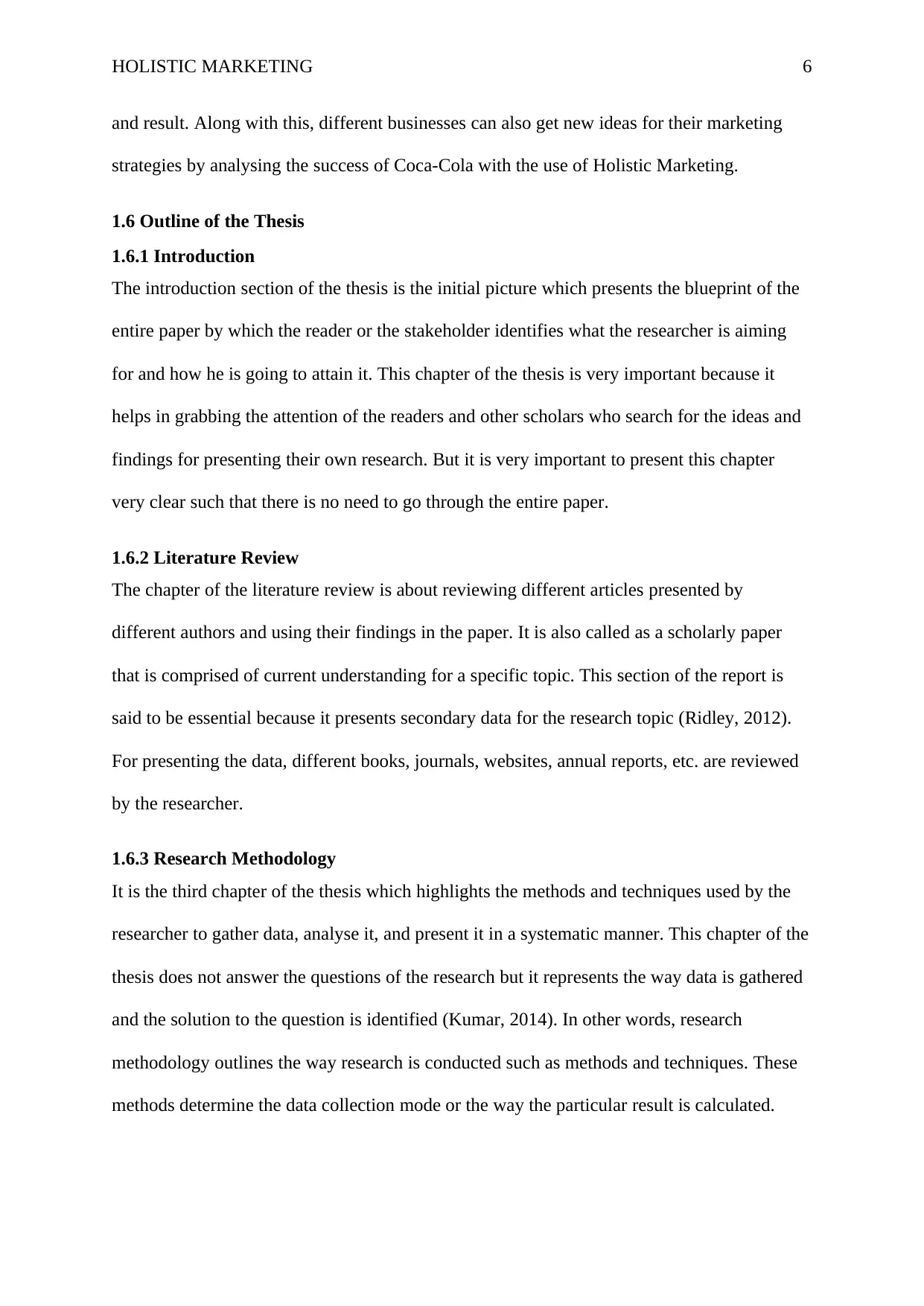
HOLISTIC MARKETING 6
and result. Along with this, different businesses can also get new ideas for their marketing
strategies by analysing the success of Coca-Cola with the use of Holistic Marketing.
1.6 Outline of the Thesis
1.6.1 Introduction
The introduction section of the thesis is the initial picture which presents the blueprint of the
entire paper by which the reader or the stakeholder identifies what the researcher is aiming
for and how he is going to attain it. This chapter of the thesis is very important because it
helps in grabbing the attention of the readers and other scholars who search for the ideas and
findings for presenting their own research. But it is very important to present this chapter
very clear such that there is no need to go through the entire paper.
1.6.2 Literature Review
The chapter of the literature review is about reviewing different articles presented by
different authors and using their findings in the paper. It is also called as a scholarly paper
that is comprised of current understanding for a specific topic. This section of the report is
said to be essential because it presents secondary data for the research topic (Ridley, 2012).
For presenting the data, different books, journals, websites, annual reports, etc. are reviewed
by the researcher.
1.6.3 Research Methodology
It is the third chapter of the thesis which highlights the methods and techniques used by the
researcher to gather data, analyse it, and present it in a systematic manner. This chapter of the
thesis does not answer the questions of the research but it represents the way data is gathered
and the solution to the question is identified (Kumar, 2014). In other words, research
methodology outlines the way research is conducted such as methods and techniques. These
methods determine the data collection mode or the way the particular result is calculated.
and result. Along with this, different businesses can also get new ideas for their marketing
strategies by analysing the success of Coca-Cola with the use of Holistic Marketing.
1.6 Outline of the Thesis
1.6.1 Introduction
The introduction section of the thesis is the initial picture which presents the blueprint of the
entire paper by which the reader or the stakeholder identifies what the researcher is aiming
for and how he is going to attain it. This chapter of the thesis is very important because it
helps in grabbing the attention of the readers and other scholars who search for the ideas and
findings for presenting their own research. But it is very important to present this chapter
very clear such that there is no need to go through the entire paper.
1.6.2 Literature Review
The chapter of the literature review is about reviewing different articles presented by
different authors and using their findings in the paper. It is also called as a scholarly paper
that is comprised of current understanding for a specific topic. This section of the report is
said to be essential because it presents secondary data for the research topic (Ridley, 2012).
For presenting the data, different books, journals, websites, annual reports, etc. are reviewed
by the researcher.
1.6.3 Research Methodology
It is the third chapter of the thesis which highlights the methods and techniques used by the
researcher to gather data, analyse it, and present it in a systematic manner. This chapter of the
thesis does not answer the questions of the research but it represents the way data is gathered
and the solution to the question is identified (Kumar, 2014). In other words, research
methodology outlines the way research is conducted such as methods and techniques. These
methods determine the data collection mode or the way the particular result is calculated.
Paraphrase This Document
Need a fresh take? Get an instant paraphrase of this document with our AI Paraphraser
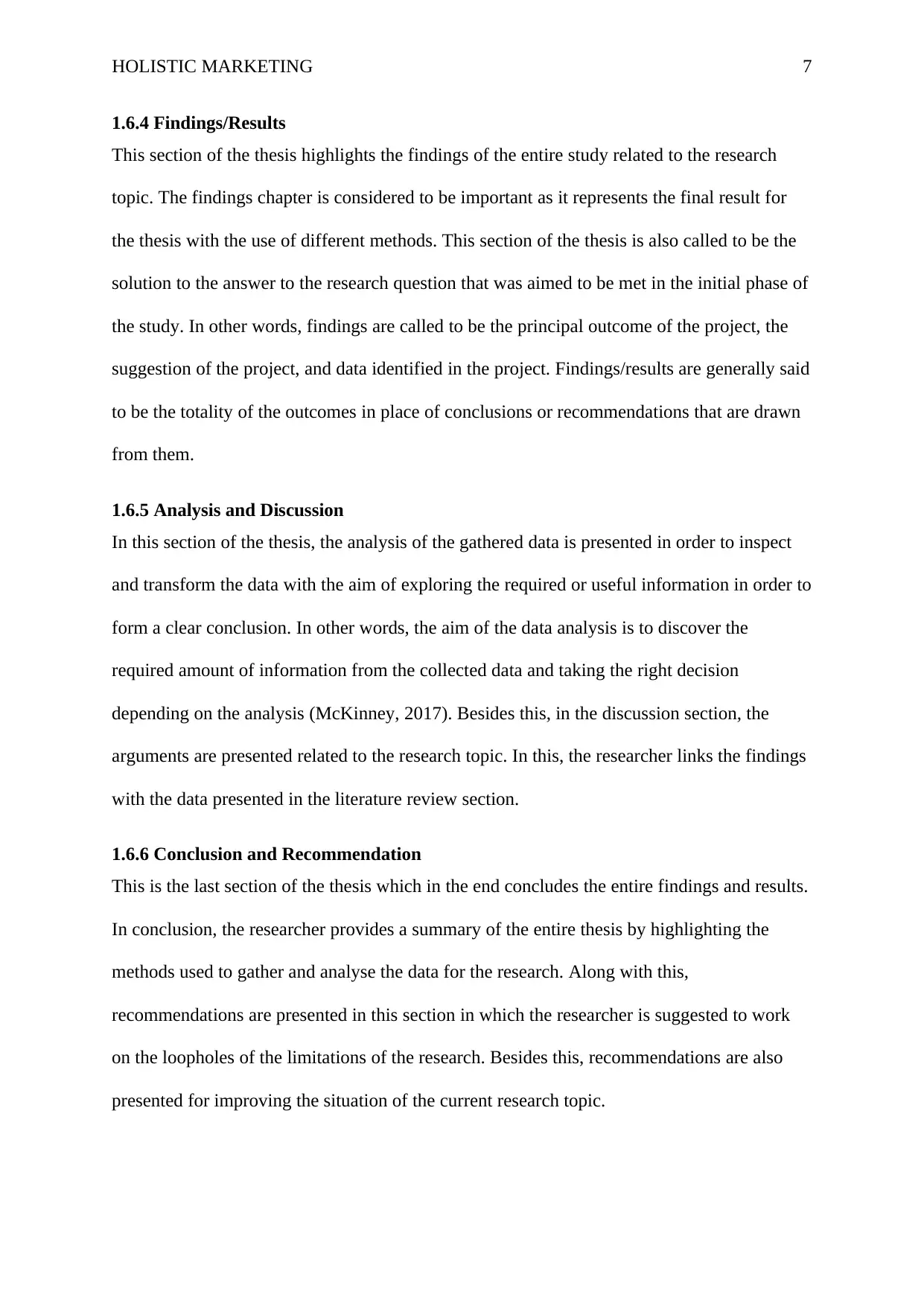
HOLISTIC MARKETING 7
1.6.4 Findings/Results
This section of the thesis highlights the findings of the entire study related to the research
topic. The findings chapter is considered to be important as it represents the final result for
the thesis with the use of different methods. This section of the thesis is also called to be the
solution to the answer to the research question that was aimed to be met in the initial phase of
the study. In other words, findings are called to be the principal outcome of the project, the
suggestion of the project, and data identified in the project. Findings/results are generally said
to be the totality of the outcomes in place of conclusions or recommendations that are drawn
from them.
1.6.5 Analysis and Discussion
In this section of the thesis, the analysis of the gathered data is presented in order to inspect
and transform the data with the aim of exploring the required or useful information in order to
form a clear conclusion. In other words, the aim of the data analysis is to discover the
required amount of information from the collected data and taking the right decision
depending on the analysis (McKinney, 2017). Besides this, in the discussion section, the
arguments are presented related to the research topic. In this, the researcher links the findings
with the data presented in the literature review section.
1.6.6 Conclusion and Recommendation
This is the last section of the thesis which in the end concludes the entire findings and results.
In conclusion, the researcher provides a summary of the entire thesis by highlighting the
methods used to gather and analyse the data for the research. Along with this,
recommendations are presented in this section in which the researcher is suggested to work
on the loopholes of the limitations of the research. Besides this, recommendations are also
presented for improving the situation of the current research topic.
1.6.4 Findings/Results
This section of the thesis highlights the findings of the entire study related to the research
topic. The findings chapter is considered to be important as it represents the final result for
the thesis with the use of different methods. This section of the thesis is also called to be the
solution to the answer to the research question that was aimed to be met in the initial phase of
the study. In other words, findings are called to be the principal outcome of the project, the
suggestion of the project, and data identified in the project. Findings/results are generally said
to be the totality of the outcomes in place of conclusions or recommendations that are drawn
from them.
1.6.5 Analysis and Discussion
In this section of the thesis, the analysis of the gathered data is presented in order to inspect
and transform the data with the aim of exploring the required or useful information in order to
form a clear conclusion. In other words, the aim of the data analysis is to discover the
required amount of information from the collected data and taking the right decision
depending on the analysis (McKinney, 2017). Besides this, in the discussion section, the
arguments are presented related to the research topic. In this, the researcher links the findings
with the data presented in the literature review section.
1.6.6 Conclusion and Recommendation
This is the last section of the thesis which in the end concludes the entire findings and results.
In conclusion, the researcher provides a summary of the entire thesis by highlighting the
methods used to gather and analyse the data for the research. Along with this,
recommendations are presented in this section in which the researcher is suggested to work
on the loopholes of the limitations of the research. Besides this, recommendations are also
presented for improving the situation of the current research topic.
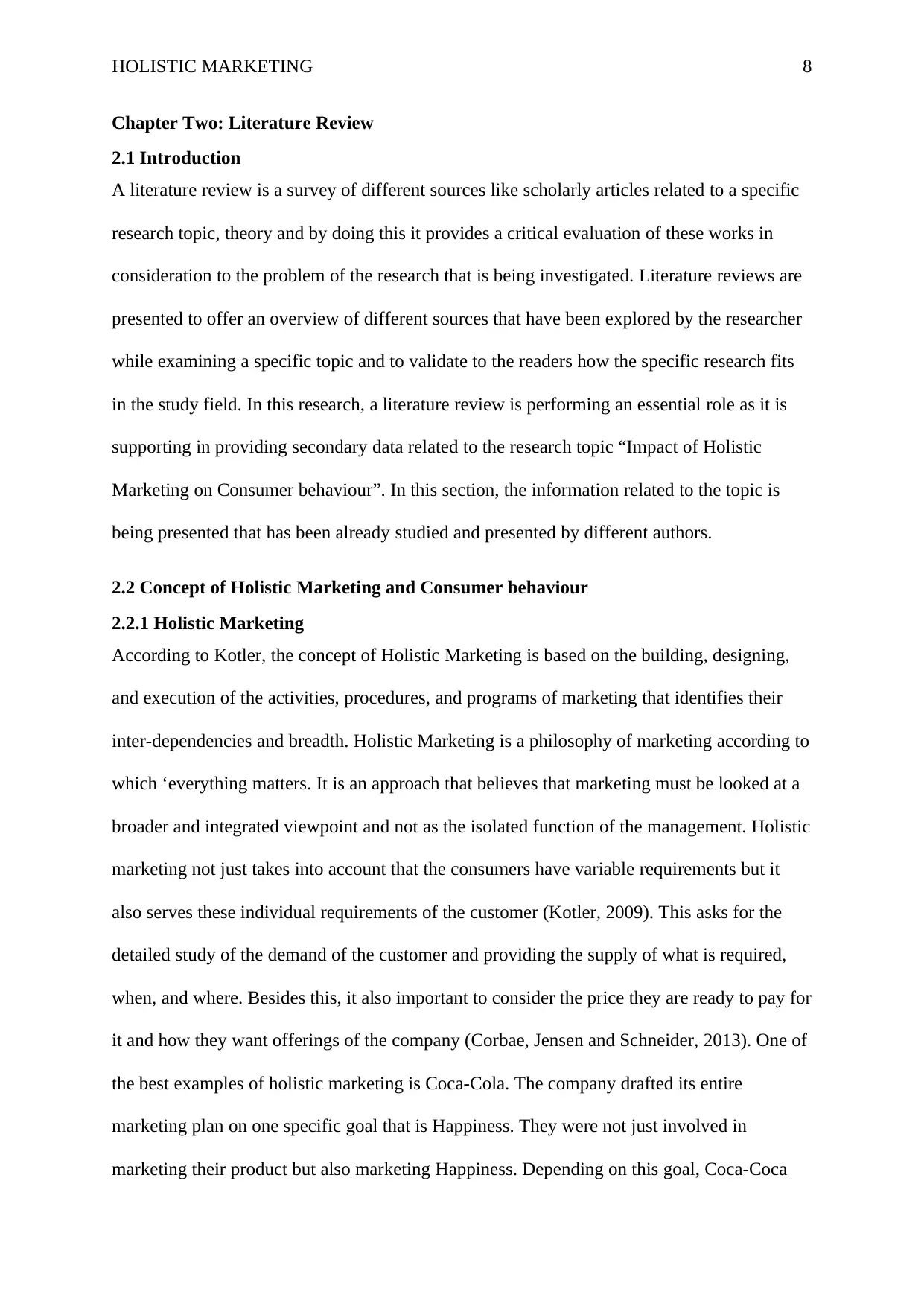
HOLISTIC MARKETING 8
Chapter Two: Literature Review
2.1 Introduction
A literature review is a survey of different sources like scholarly articles related to a specific
research topic, theory and by doing this it provides a critical evaluation of these works in
consideration to the problem of the research that is being investigated. Literature reviews are
presented to offer an overview of different sources that have been explored by the researcher
while examining a specific topic and to validate to the readers how the specific research fits
in the study field. In this research, a literature review is performing an essential role as it is
supporting in providing secondary data related to the research topic “Impact of Holistic
Marketing on Consumer behaviour”. In this section, the information related to the topic is
being presented that has been already studied and presented by different authors.
2.2 Concept of Holistic Marketing and Consumer behaviour
2.2.1 Holistic Marketing
According to Kotler, the concept of Holistic Marketing is based on the building, designing,
and execution of the activities, procedures, and programs of marketing that identifies their
inter-dependencies and breadth. Holistic Marketing is a philosophy of marketing according to
which ‘everything matters. It is an approach that believes that marketing must be looked at a
broader and integrated viewpoint and not as the isolated function of the management. Holistic
marketing not just takes into account that the consumers have variable requirements but it
also serves these individual requirements of the customer (Kotler, 2009). This asks for the
detailed study of the demand of the customer and providing the supply of what is required,
when, and where. Besides this, it also important to consider the price they are ready to pay for
it and how they want offerings of the company (Corbae, Jensen and Schneider, 2013). One of
the best examples of holistic marketing is Coca-Cola. The company drafted its entire
marketing plan on one specific goal that is Happiness. They were not just involved in
marketing their product but also marketing Happiness. Depending on this goal, Coca-Coca
Chapter Two: Literature Review
2.1 Introduction
A literature review is a survey of different sources like scholarly articles related to a specific
research topic, theory and by doing this it provides a critical evaluation of these works in
consideration to the problem of the research that is being investigated. Literature reviews are
presented to offer an overview of different sources that have been explored by the researcher
while examining a specific topic and to validate to the readers how the specific research fits
in the study field. In this research, a literature review is performing an essential role as it is
supporting in providing secondary data related to the research topic “Impact of Holistic
Marketing on Consumer behaviour”. In this section, the information related to the topic is
being presented that has been already studied and presented by different authors.
2.2 Concept of Holistic Marketing and Consumer behaviour
2.2.1 Holistic Marketing
According to Kotler, the concept of Holistic Marketing is based on the building, designing,
and execution of the activities, procedures, and programs of marketing that identifies their
inter-dependencies and breadth. Holistic Marketing is a philosophy of marketing according to
which ‘everything matters. It is an approach that believes that marketing must be looked at a
broader and integrated viewpoint and not as the isolated function of the management. Holistic
marketing not just takes into account that the consumers have variable requirements but it
also serves these individual requirements of the customer (Kotler, 2009). This asks for the
detailed study of the demand of the customer and providing the supply of what is required,
when, and where. Besides this, it also important to consider the price they are ready to pay for
it and how they want offerings of the company (Corbae, Jensen and Schneider, 2013). One of
the best examples of holistic marketing is Coca-Cola. The company drafted its entire
marketing plan on one specific goal that is Happiness. They were not just involved in
marketing their product but also marketing Happiness. Depending on this goal, Coca-Coca
⊘ This is a preview!⊘
Do you want full access?
Subscribe today to unlock all pages.

Trusted by 1+ million students worldwide
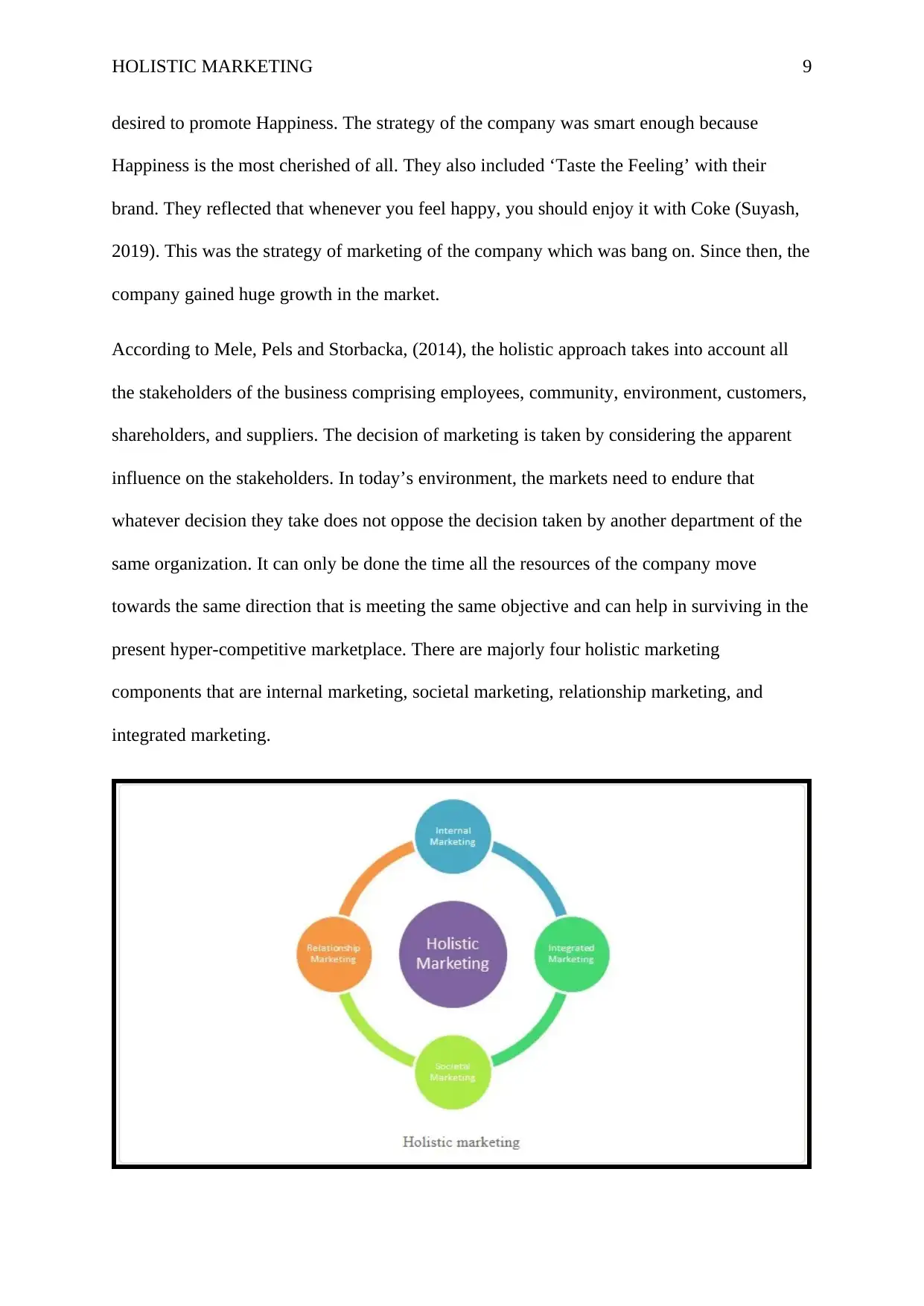
HOLISTIC MARKETING 9
desired to promote Happiness. The strategy of the company was smart enough because
Happiness is the most cherished of all. They also included ‘Taste the Feeling’ with their
brand. They reflected that whenever you feel happy, you should enjoy it with Coke (Suyash,
2019). This was the strategy of marketing of the company which was bang on. Since then, the
company gained huge growth in the market.
According to Mele, Pels and Storbacka, (2014), the holistic approach takes into account all
the stakeholders of the business comprising employees, community, environment, customers,
shareholders, and suppliers. The decision of marketing is taken by considering the apparent
influence on the stakeholders. In today’s environment, the markets need to endure that
whatever decision they take does not oppose the decision taken by another department of the
same organization. It can only be done the time all the resources of the company move
towards the same direction that is meeting the same objective and can help in surviving in the
present hyper-competitive marketplace. There are majorly four holistic marketing
components that are internal marketing, societal marketing, relationship marketing, and
integrated marketing.
desired to promote Happiness. The strategy of the company was smart enough because
Happiness is the most cherished of all. They also included ‘Taste the Feeling’ with their
brand. They reflected that whenever you feel happy, you should enjoy it with Coke (Suyash,
2019). This was the strategy of marketing of the company which was bang on. Since then, the
company gained huge growth in the market.
According to Mele, Pels and Storbacka, (2014), the holistic approach takes into account all
the stakeholders of the business comprising employees, community, environment, customers,
shareholders, and suppliers. The decision of marketing is taken by considering the apparent
influence on the stakeholders. In today’s environment, the markets need to endure that
whatever decision they take does not oppose the decision taken by another department of the
same organization. It can only be done the time all the resources of the company move
towards the same direction that is meeting the same objective and can help in surviving in the
present hyper-competitive marketplace. There are majorly four holistic marketing
components that are internal marketing, societal marketing, relationship marketing, and
integrated marketing.
Paraphrase This Document
Need a fresh take? Get an instant paraphrase of this document with our AI Paraphraser
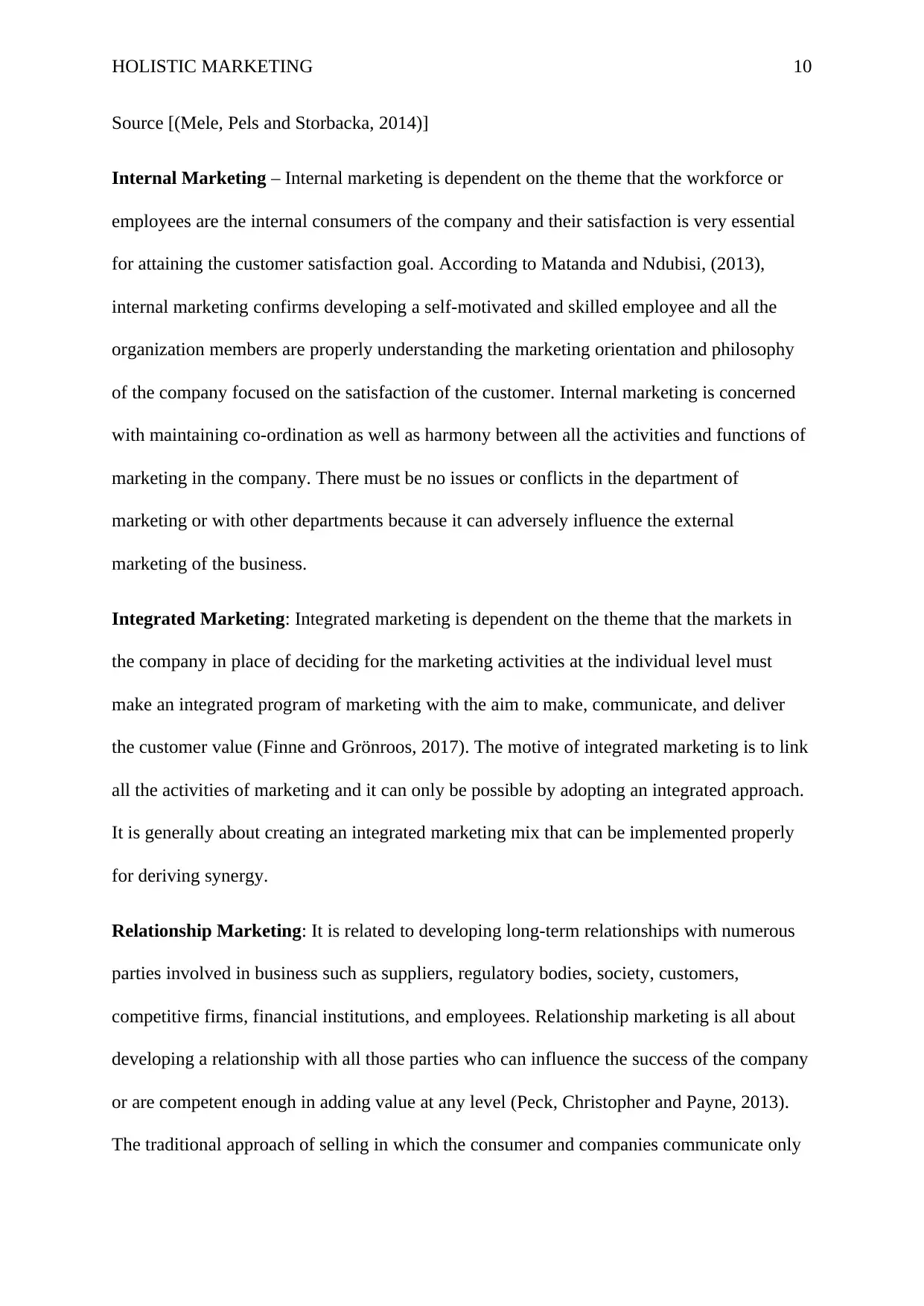
HOLISTIC MARKETING 10
Source [(Mele, Pels and Storbacka, 2014)]
Internal Marketing – Internal marketing is dependent on the theme that the workforce or
employees are the internal consumers of the company and their satisfaction is very essential
for attaining the customer satisfaction goal. According to Matanda and Ndubisi, (2013),
internal marketing confirms developing a self-motivated and skilled employee and all the
organization members are properly understanding the marketing orientation and philosophy
of the company focused on the satisfaction of the customer. Internal marketing is concerned
with maintaining co-ordination as well as harmony between all the activities and functions of
marketing in the company. There must be no issues or conflicts in the department of
marketing or with other departments because it can adversely influence the external
marketing of the business.
Integrated Marketing: Integrated marketing is dependent on the theme that the markets in
the company in place of deciding for the marketing activities at the individual level must
make an integrated program of marketing with the aim to make, communicate, and deliver
the customer value (Finne and Grönroos, 2017). The motive of integrated marketing is to link
all the activities of marketing and it can only be possible by adopting an integrated approach.
It is generally about creating an integrated marketing mix that can be implemented properly
for deriving synergy.
Relationship Marketing: It is related to developing long-term relationships with numerous
parties involved in business such as suppliers, regulatory bodies, society, customers,
competitive firms, financial institutions, and employees. Relationship marketing is all about
developing a relationship with all those parties who can influence the success of the company
or are competent enough in adding value at any level (Peck, Christopher and Payne, 2013).
The traditional approach of selling in which the consumer and companies communicate only
Source [(Mele, Pels and Storbacka, 2014)]
Internal Marketing – Internal marketing is dependent on the theme that the workforce or
employees are the internal consumers of the company and their satisfaction is very essential
for attaining the customer satisfaction goal. According to Matanda and Ndubisi, (2013),
internal marketing confirms developing a self-motivated and skilled employee and all the
organization members are properly understanding the marketing orientation and philosophy
of the company focused on the satisfaction of the customer. Internal marketing is concerned
with maintaining co-ordination as well as harmony between all the activities and functions of
marketing in the company. There must be no issues or conflicts in the department of
marketing or with other departments because it can adversely influence the external
marketing of the business.
Integrated Marketing: Integrated marketing is dependent on the theme that the markets in
the company in place of deciding for the marketing activities at the individual level must
make an integrated program of marketing with the aim to make, communicate, and deliver
the customer value (Finne and Grönroos, 2017). The motive of integrated marketing is to link
all the activities of marketing and it can only be possible by adopting an integrated approach.
It is generally about creating an integrated marketing mix that can be implemented properly
for deriving synergy.
Relationship Marketing: It is related to developing long-term relationships with numerous
parties involved in business such as suppliers, regulatory bodies, society, customers,
competitive firms, financial institutions, and employees. Relationship marketing is all about
developing a relationship with all those parties who can influence the success of the company
or are competent enough in adding value at any level (Peck, Christopher and Payne, 2013).
The traditional approach of selling in which the consumer and companies communicate only
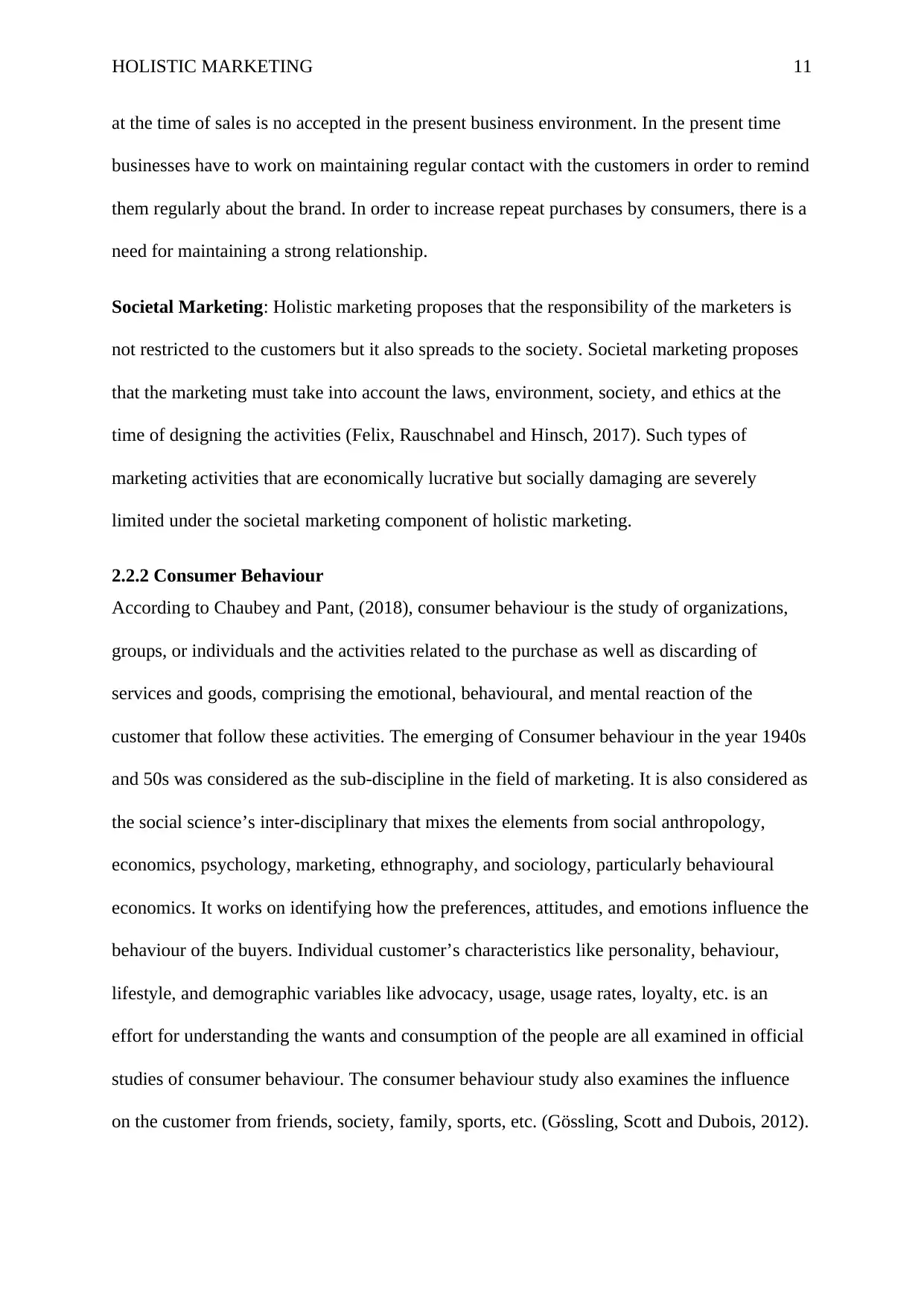
HOLISTIC MARKETING 11
at the time of sales is no accepted in the present business environment. In the present time
businesses have to work on maintaining regular contact with the customers in order to remind
them regularly about the brand. In order to increase repeat purchases by consumers, there is a
need for maintaining a strong relationship.
Societal Marketing: Holistic marketing proposes that the responsibility of the marketers is
not restricted to the customers but it also spreads to the society. Societal marketing proposes
that the marketing must take into account the laws, environment, society, and ethics at the
time of designing the activities (Felix, Rauschnabel and Hinsch, 2017). Such types of
marketing activities that are economically lucrative but socially damaging are severely
limited under the societal marketing component of holistic marketing.
2.2.2 Consumer Behaviour
According to Chaubey and Pant, (2018), consumer behaviour is the study of organizations,
groups, or individuals and the activities related to the purchase as well as discarding of
services and goods, comprising the emotional, behavioural, and mental reaction of the
customer that follow these activities. The emerging of Consumer behaviour in the year 1940s
and 50s was considered as the sub-discipline in the field of marketing. It is also considered as
the social science’s inter-disciplinary that mixes the elements from social anthropology,
economics, psychology, marketing, ethnography, and sociology, particularly behavioural
economics. It works on identifying how the preferences, attitudes, and emotions influence the
behaviour of the buyers. Individual customer’s characteristics like personality, behaviour,
lifestyle, and demographic variables like advocacy, usage, usage rates, loyalty, etc. is an
effort for understanding the wants and consumption of the people are all examined in official
studies of consumer behaviour. The consumer behaviour study also examines the influence
on the customer from friends, society, family, sports, etc. (Gössling, Scott and Dubois, 2012).
at the time of sales is no accepted in the present business environment. In the present time
businesses have to work on maintaining regular contact with the customers in order to remind
them regularly about the brand. In order to increase repeat purchases by consumers, there is a
need for maintaining a strong relationship.
Societal Marketing: Holistic marketing proposes that the responsibility of the marketers is
not restricted to the customers but it also spreads to the society. Societal marketing proposes
that the marketing must take into account the laws, environment, society, and ethics at the
time of designing the activities (Felix, Rauschnabel and Hinsch, 2017). Such types of
marketing activities that are economically lucrative but socially damaging are severely
limited under the societal marketing component of holistic marketing.
2.2.2 Consumer Behaviour
According to Chaubey and Pant, (2018), consumer behaviour is the study of organizations,
groups, or individuals and the activities related to the purchase as well as discarding of
services and goods, comprising the emotional, behavioural, and mental reaction of the
customer that follow these activities. The emerging of Consumer behaviour in the year 1940s
and 50s was considered as the sub-discipline in the field of marketing. It is also considered as
the social science’s inter-disciplinary that mixes the elements from social anthropology,
economics, psychology, marketing, ethnography, and sociology, particularly behavioural
economics. It works on identifying how the preferences, attitudes, and emotions influence the
behaviour of the buyers. Individual customer’s characteristics like personality, behaviour,
lifestyle, and demographic variables like advocacy, usage, usage rates, loyalty, etc. is an
effort for understanding the wants and consumption of the people are all examined in official
studies of consumer behaviour. The consumer behaviour study also examines the influence
on the customer from friends, society, family, sports, etc. (Gössling, Scott and Dubois, 2012).
⊘ This is a preview!⊘
Do you want full access?
Subscribe today to unlock all pages.

Trusted by 1+ million students worldwide
1 out of 24
Related Documents
Your All-in-One AI-Powered Toolkit for Academic Success.
+13062052269
info@desklib.com
Available 24*7 on WhatsApp / Email
![[object Object]](/_next/static/media/star-bottom.7253800d.svg)
Unlock your academic potential
Copyright © 2020–2025 A2Z Services. All Rights Reserved. Developed and managed by ZUCOL.




